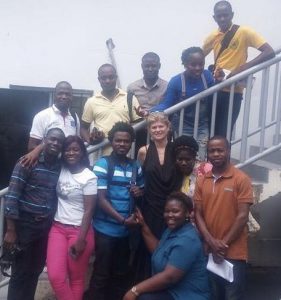The Regional Resource Governance in West Africa (ReGo) Programme, funded by German Development Cooperation and implemented by Deutsche Gesellschaft für Internationale Zusammenarbeit (GIZ) GmbH, strengthens the investigative skills of 34 local journalists in three countries to report on the impacts of the mining sector and contribute to a well-informed public debate.
Reporting on the mining sector does not only require awareness of the subject, but hands-on investigative skills and technical knowledge across various aspects of the sector. It was only because these requirements were fulfilled, that the Panama Papers, published by the Sueddeutsche Zeitung and the International Consortium of Investigative Journalists, had the enormous impact they had. Local media outlets in the Manu River Union (MRU) rarely possess enough resources, the technical knowledge and journalistic skills to bring the quality of their news stories up to a standard which can contribute to a meaningful public debate.
A Liberian journalist explains during an interview with ReGo: “I had little idea about the mining sector. I knew that the government did business with big companies on behalf of the Liberian people, but I was not aware about its impacts. I also did not know a lot about artisanal and illicit mining and how it impacts food production, education and the environment of our communities.”
Seeing the need for action, ReGo supported the capacity development of 34 journalists between 2017 and 2018. In Côte d´Ivoire and Guinea on-the-job training was implemented in collaboration with the Thomson Reuters Foundation (TRF). It took a regional perspective by encouraging an exchange of experiences during a regional exchange workshop and the development of cross-border stories. In Liberia, ReGo worked primarily in collaboration with New Narratives through workshops and mentoring programmes.

Throughout the programme, journalists from various media outlets (bloggers, newspapers, radio and TV) were trained on technical issues of the sector as well as investigative and journalism methods. To apply their newly acquired skills, journalists further received a mixture of targeted funding (to help participants cover the costs of reporting) and one-to-one mentoring while developing their own stories.
“This project has been beneficial to me in many ways, not only in terms of documentary rigour and investigation. I also learned many new terms related to the mining sector. I was touched by the human aspect and relevance of the articles published,” states a Guinean in a follow up interview with ReGo.
Participating journalists published a total of 59 investigative stories, 30 of which were published in Côte d´Ivoire and Guinea and 29 in Liberia. 10 of the stories covered cross-border issues affecting populations in Côte d´Ivoire and Guinea. In Liberia, the journalist Anthony Stephens won the national award for best investigative reporting for a story he produced on the environmental impacts of the artisanal mining sector as part of the program.
A follow up assessment of the programme in Liberia demonstrated that the quality of extractives reporting by the journalists improved across various dimensions – as a result, for instance, stories included more facts and data and reflected multiple perspectives on the same issue. The programme also stood out by taking a special focus on supporting female journalists.
In Côte d´Ivoire and Guinea, an independent M&E report demonstrated that the training had a strong impact on participants’ knowledge about the extractives sector, with a fourfold increase of their technical knowledge including sector-specific terminology. The assessment also demonstrated an improvement in the approach on investing and researching stories – for example during follow-up interviews, participants regarded credibility of sources, analysis, and research as key elements of a good story. Stories written by the journalists after the training also significantly improved in quality and depth of the research relative to stories written before.
To amplify exposure of the Liberian stories, five radio and TV panels (such as this one) gave the reporters the opportunity to discuss their reporting with audiences in live call-in programs. Stories produced as part of the programme in Côte d´Ivoire and Guinea were read on average by 200 citizens and were frequently republished. In Côte d´Ivoire, for instance, a participant even reported 5000 reads for one story during a follow-up interview with ReGo.
More than a year after the training, participants expressed that they still benefit from their acquired skills. 7 out of 12 trained journalists in the three countries state that they report more on mining sector issues since the training. A Guinean journalist even states that since the training ‘I am regarded as a journalist specialised on mining issues by my team. Certain structures in the civil society (such as Publish What You Pay and Actions Mines Guinée), now invite me regularly when they publish the results of a study on the sector.
But challenges remain. As financial resources are scarce, journalists and their media outlets in the MRU struggle to build an independent business model that will support independent journalism over the long term. Furthermore, according to the Freedom House Index of 2018, the press freedom status of Liberia and Côte d’Ivoire is partly free, while in Guinea, it is considered not free.[1] This is because national media houses oftentimes exhibit partisanship in their coverage. In Guinea, freedom of expression is difficult to be upheld in practice. Journalists who report critically on the authorities can face intimidation and violence by party activists.[1]
It is against this background, that GIZ ReGo and collaborating partners continue to contribute to a more free and fact-based public debate on sensitive or conflict-prone issues in the mining sector.
For questions, feedback or comments, please contact Kim Rahel Schultze ([email protected]) and Stefanie Heerwig ([email protected]) from GIZ or Prue Clarke ([email protected]) from New Narratives.
